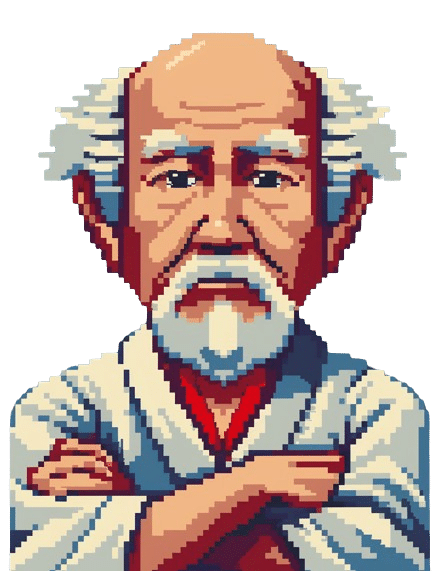Ah, the timeless wisdom of George W. Bush: 'Rarely is the question asked: Is our children learning?'. This iconic Bushism not only tickled funny bones but also shed light on the importance of articulate communication. The incident sparked a mix of laughter and critique, with hashtags and memes lampooning the linguistic slip. It became a teachable moment on educational priorities and the impact of public gaffes. Stay tuned, there's more to discover about the lasting legacy of this linguistic blunder and its unexpected repercussions.
Historical Context
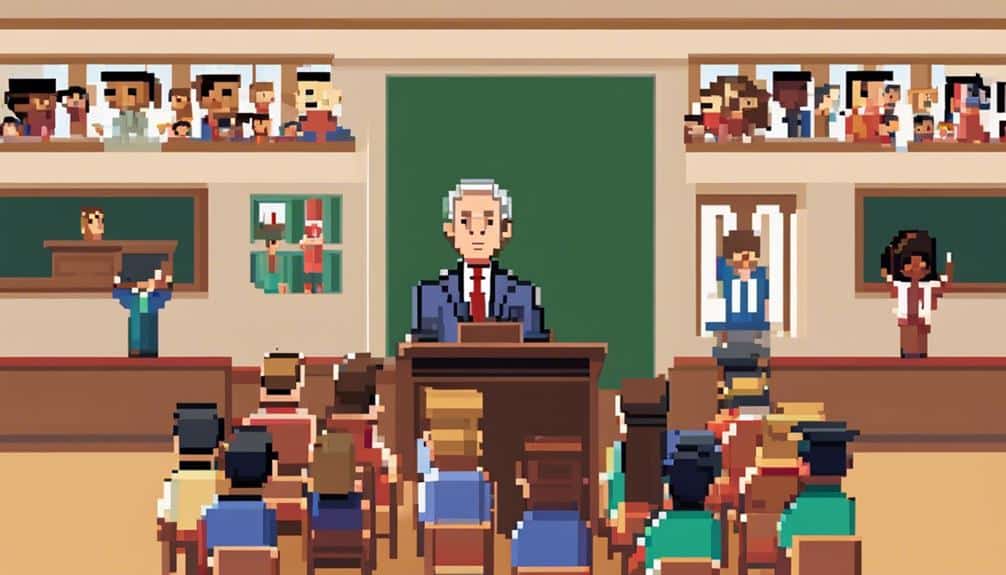
Imagine this: the year is 1999, and George W. Bush, known for his eloquence with words, drops a bombshell during a presidential campaign speech. 'Rarely is the question asked: Is our children learning?' Cue the collective head scratching of the nation. It was a moment that left many wondering if our children were indeed learning proper grammar.
In the late '90s, educational reform was a hot topic. Standardized testing, No Child Left Behind – all the rage. And then, out of the blue, comes this gem of a statement. Bush's words, a perfect blend of confusion and amusement, highlighting a critical issue in a hilariously unconventional way.
It was a reminder that even the most powerful leaders can fumble over words, making us question not just our children's education but also the language skills of those in charge. Oh, the irony!
Public Reaction
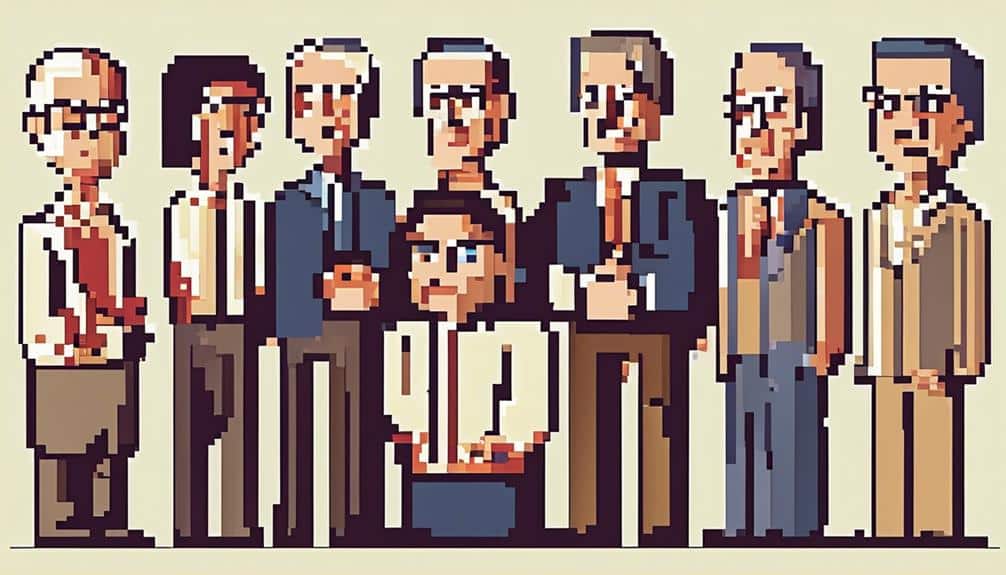
So, you remember when George W. Bush dropped that gem about 'Is Our Children Learning'? Oh, the public reaction was pure gold! From the endless mockery to the outrage on social media, it was a full-on roast fest.
And let's not forget the educational system getting a thorough critique – talk about stirring the pot!
Public Mockery Response
Public reaction to George W. Bush's infamous statement, 'Rarely is the question asked: Is our children learning,' was a mix of amusement and criticism. Memes featuring confused children holding up misspelled signs flooded social media, while late-night talk show hosts couldn't resist turning the blunder into punchlines. The public couldn't help but chuckle at the irony of a statement about education being poorly articulated. Bush inadvertently became the poster child for the importance of verifying before speaking.
Some took a more serious approach, highlighting the significance of clear communication, especially from public figures. However, the prevailing sentiment seemed to be one of light-hearted mockery rather than outright outrage. People joked about starting a fundraiser to confirm that 'our children learning' became a reality or suggested Bush enroll in an English class himself.
In the end, the incident served as a reminder that even the most powerful individuals aren't immune to verbal slip-ups, providing the public with a moment of collective amusement at the expense of a former president's linguistic fumble.
Social Media Outrage
Amid the widespread public reaction to George W. Bush's statement, 'Rarely is the question asked: Is our children learning,' social media users expressed a range of emotions, including outrage. Your feed was flooded with fiery comments, memes, and GIFs, all aimed at highlighting the irony of a former president's slip-up on education.
The hashtags #IsOurChildrenLearning and #Bushisms trended worldwide, with users releasing their creativity in crafting witty comebacks and hilarious interpretations of the blunder.
From sarcastic remarks about the state of the educational system to exaggerated claims about the fate of our future generations, social media outrage was at its peak. Some users even took it upon themselves to create mock lesson plans titled 'How Not to Speak Like Bush 101,' adding a touch of humor to the situation.
Despite the seriousness of the topic, the online community couldn't help but turn the gaffe into a comedic goldmine, proving once again that the internet has a knack for turning even the most serious moments into a laughing matter.
Educational System Critique
Users across various social media platforms have been vocal in their critique of the educational system after George W. Bush's infamous statement regarding children's learning abilities. It seems like everyone suddenly became an armchair expert on education, offering their two cents on how to fix the system.
From memes about algebra being the most complex relationship people have, to tweets suggesting that the only thing they learned in school was how to avoid actually learning, the internet was flooded with witty criticisms and exaggerated anecdotes.
Parents lamented about having to relearn long division just to help their kids with homework, while former students reminisced about how they still can't find a practical use for knowing the Pythagorean theorem. The consensus seemed to be that the educational system was more focused on memorization than fostering critical thinking skills.
Some even joked that they learned more about preparing for standardized tests than real-life problem-solving. It's clear that Bush's question about our children learning struck a nerve, sparking a wave of humorously insightful observations about the flaws in our education system.
Educational Implications
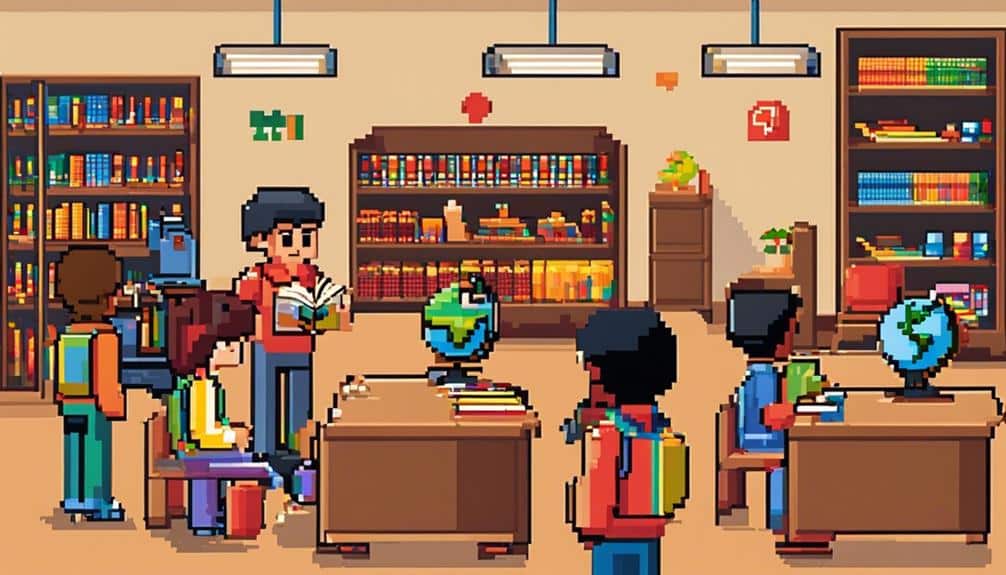
Consider the impact on school curriculum and teaching methods when examining the educational implications of George W. Bush's statement 'Rarely Is the Question Asked: Is Our Children Learning.' Let's delve into this educational rabbit hole and uncover the mysteries of modern pedagogy.
With the profound wisdom of our leaders echoing through the hallowed halls of academia, one can't help but wonder: are our children truly learning, or are they just mastering the art of looking attentive while daydreaming about lunch?
In light of such existential ponderings, schools may find themselves reevaluating their approach to education. Perhaps we'll see a surge in standardized tests with questions like, 'If Johnny has five apples and gives two to Susie, how many pineapples does George Washington own?'
Innovative teaching methods might include interpretive dance to illustrate algebraic equations or Shakespearean soliloquies to explain the periodic table.
As we navigate these uncharted waters of educational reform, one thing is certain – the question of 'Is Our Children Learning?' will continue to baffle and bemuse us, much like a riddle wrapped in a mystery inside an algebra problem.
Leadership Reflections
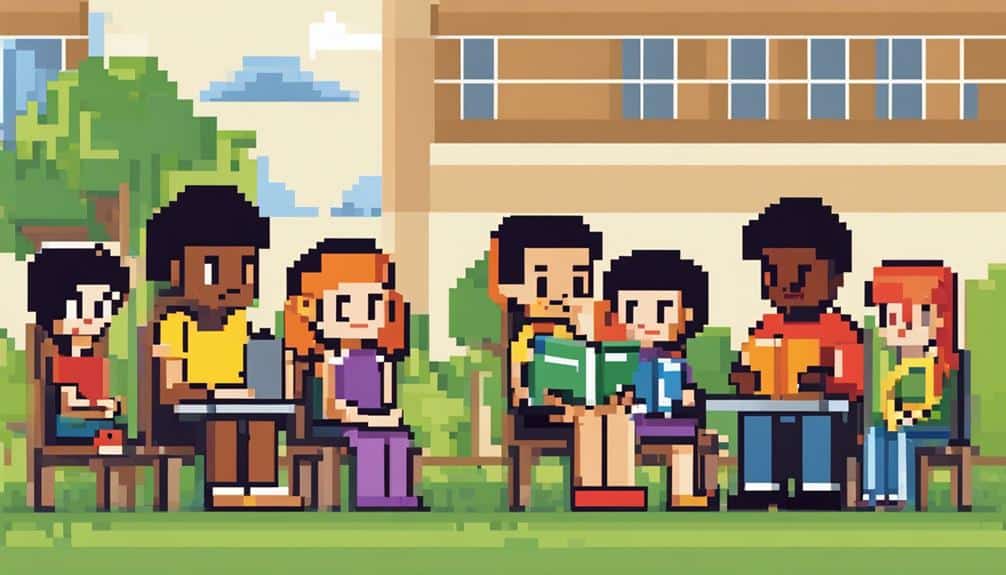
So, let's talk about Bush's communication skills – or lack thereof – because, let's face it, verbal slip-ups were practically his second language.
Then there's the impact on education, where policies seemed about as clear as a muddy puddle after a storm.
And don't even get started on the public perception shift; it's like watching a reality show where the protagonist keeps changing the script every episode.
Bush's Communication Skills
Rarely does George W. Bush's communication style fail to spark discussion and reflection on leadership qualities. Despite being a master of unintentional comedy, Bush's communication skills often left people wondering if they were witnessing a presidential speech or a stand-up comedy routine.
His famous quote, 'Rarely is the question asked: Is our children learning?' became a beacon of hope for grammar enthusiasts everywhere.
Bush had a unique way of blending words together, creating what some might call 'Bushisms' – a linguistic adventure where nouns, verbs, and prepositions danced in harmony. His knack for turning a phrase into a linguistic rollercoaster left audiences both bewildered and amused.
Who can forget the classic 'misunderestimate,' a Bush original that raised eyebrows and dictionaries worldwide?
Impact on Education
Bush's leadership style had a lasting impact on education, shaping the way policies were implemented and resources allocated for future generations. While some applauded his efforts to increase accountability through initiatives like No Child Left Behind, others questioned the long-term effects of standardized testing mania that ensued. The emphasis on test scores led to an era where students were proficient at filling in bubbles but lacking in critical thinking skills – a true reflection of the wonders of modern education.
Under Bush's reign, the education scenery shifted towards a more data-driven approach, where numbers held more weight than actual student growth. Schools scrambled to meet arbitrary benchmarks, often at the expense of a well-rounded curriculum.
The legacy of Bush's educational policies lives on, with debates still raging on the effectiveness of his reforms. So, next time you hear someone reminisce about the good old days of standardized testing, just remember, it all started with a simple question: Is our children learning?
Public Perception Shift
The public's perception of George W. Bush's impact on education has undergone a significant shift, prompting reflections on his leadership style.
You see, it's like that one time you tried to convince everyone that your pet goldfish was actually a genius capable of solving complex math problems. At first, people were skeptical, but then they started to believe you, only to later realize it was all just a big fishy tale.
Similarly, Bush's education policies were initially praised as groundbreaking, but as time passed, it became clear that maybe they weren't as revolutionary as advertised.
Now, it's like watching a magic trick unravel before your eyes – the illusion fading, leaving you wondering how you ever fell for it in the first place.
The public perception shift surrounding Bush's education legacy is a bit like realizing that the emperor indeed has no clothes – a revelation that prompts a mix of amusement, disbelief, and a healthy dose of head-shaking.
Linguistic Analysis
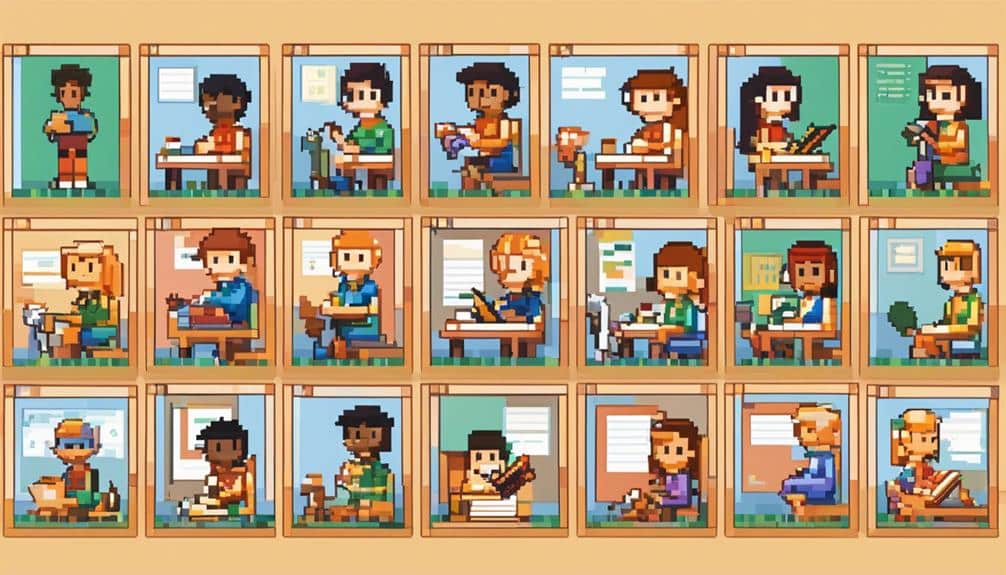
Analyzing the language used by George W. Bush in his famous quote, 'Is Our Children Learning,' reveals interesting insights into his communication style. The quote itself raises eyebrows, not just for the grammatical quirk, but for the broader pattern of linguistic gymnastics that characterized his speeches.
Bush had a unique way of blending folksy charm with a distinctive Texan drawl, often peppering his addresses with colloquialisms and malapropisms that left audiences scratching their heads. His penchant for creating new words and phrases, like 'misunderestimate' or 'the internets,' added a touch of whimsy to his otherwise serious speeches.
It was as if he'd his dictionary on shuffle mode, creating linguistic mashups that bordered on the surreal. Bush's language was a reflection of his personality – sometimes endearing, sometimes baffling, but always memorable. Love him or hate him, you couldn't deny that his way with words kept you on your toes, wondering what linguistic curveball he'd throw next.
Impact on Policy
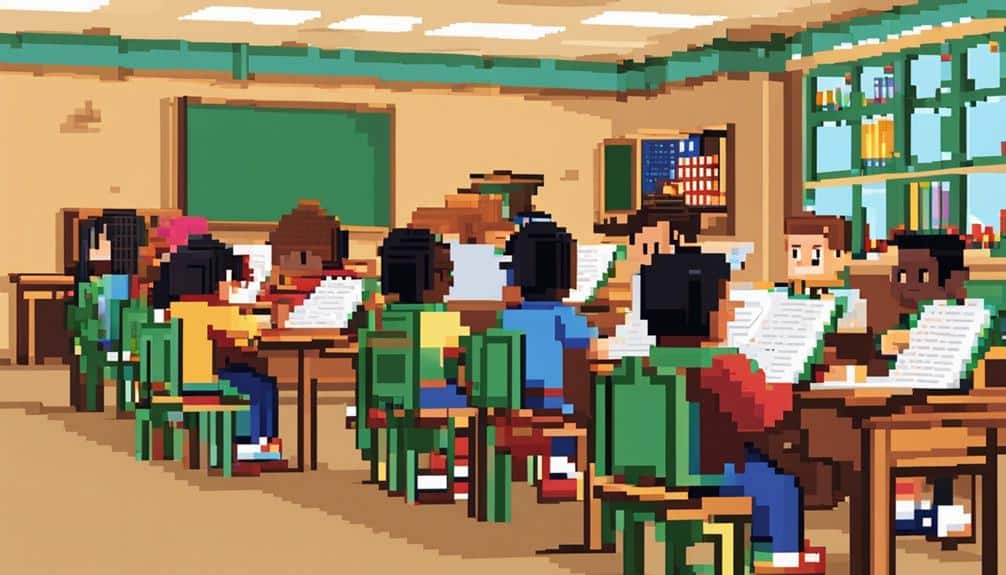
George W. Bush's unique communication style influenced the direction of policy decisions during his presidency. His memorable phrases and unconventional word choices left a lasting impact on the political terrain. Through his speeches and public addresses, Bush managed to shape policies in ways that were both puzzling and profound.
- 'Fool me once, shame on you; fool me twice, shame on me.' This famous Bushism highlighted the importance of accountability in policy-making, albeit in a somewhat confusing manner.
- 'I know the human being and fish can coexist peacefully.' This statement, while seemingly nonsensical, hinted at the need for harmony and cooperation in crafting policies that cater to diverse interests.
- 'Rarely is the question asked: Is our children learning?' Bush's concern for education policy, as expressed in this quote, underscored the significance of prioritizing the youth in governmental decisions.
- 'I'm the decider.' This bold declaration exemplified Bush's assertiveness in policy matters, even if it raised eyebrows at the time.
Media Coverage
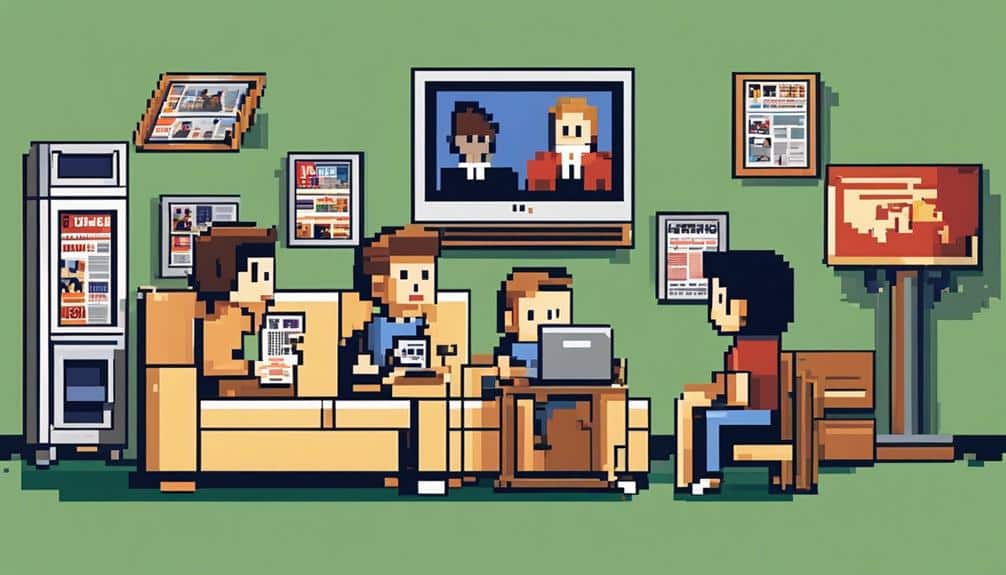
Media outlets extensively covered George W. Bush's unconventional communication style and its impact on political discourse. From his infamous verbal blunders to his unique way of delivering speeches, Bush provided journalists with a never-ending source of material to dissect and analyze.
Whether it was his struggles with pronunciation or his tendency to create new words on the spot, the media had a field day poking fun at the President's linguistic mishaps.
Bush's communication style became a focal point of news coverage, with pundits and comedians alike jumping at the chance to parody his speeches. Late-night talk shows were filled with skits imitating his Texas drawl and memorable slip-ups, further perpetuating his reputation as a linguistic enigma.
The media circus surrounding Bush's way with words often overshadowed the actual content of his messages, turning his speeches into entertainment spectacles rather than serious political addresses. Love him or hate him, one thing was for certain – Bush's linguistic legacy left a lasting impression on media coverage during his time in office.
Memorable Quotes
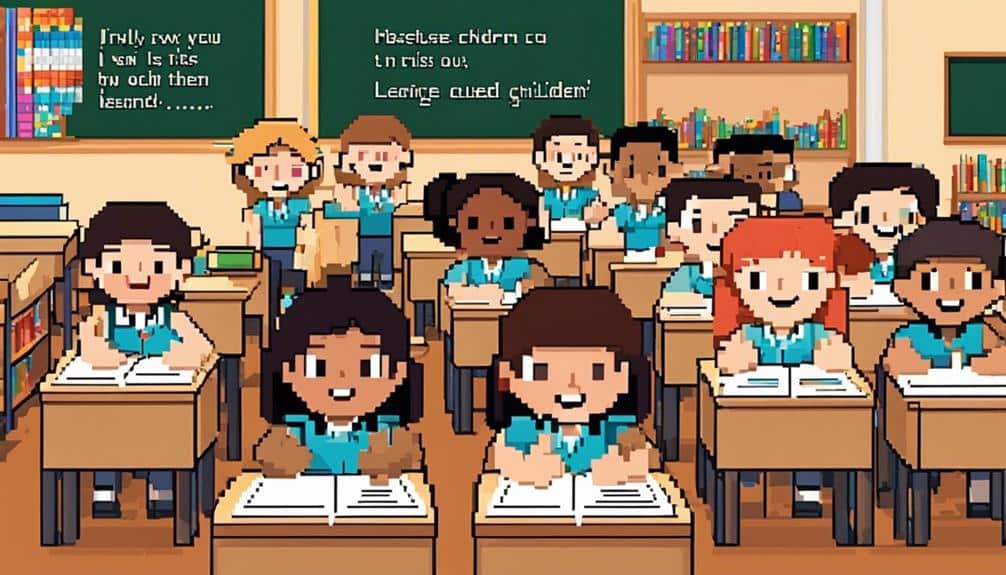
Throughout his presidency, George W. Bush delivered a series of memorable quotes that have become ingrained in the public consciousness. Get ready to chuckle and cringe as we revisit some of the most unforgettable gems from the Bush era:
- 'Rarely is the question asked: Is our children learning?' – Ah, the eternal question of our time. Are they, though?
- 'I know the human being and fish can coexist peacefully.' – Who knew aquatic diplomacy was on the agenda?
- 'Families is where our nation finds hope, where wings take dream.' – Truly poetic, Mr. President.
- 'Too many good docs are getting out of the business. Too many OB-GYNs aren't able to practice their love with women all across this country.' – A touching ode to healthcare providers and… love?
Ah, the nostalgia of simpler times when presidential speeches kept us on our toes and our eyebrows permanently raised.
Legacy and Lessons
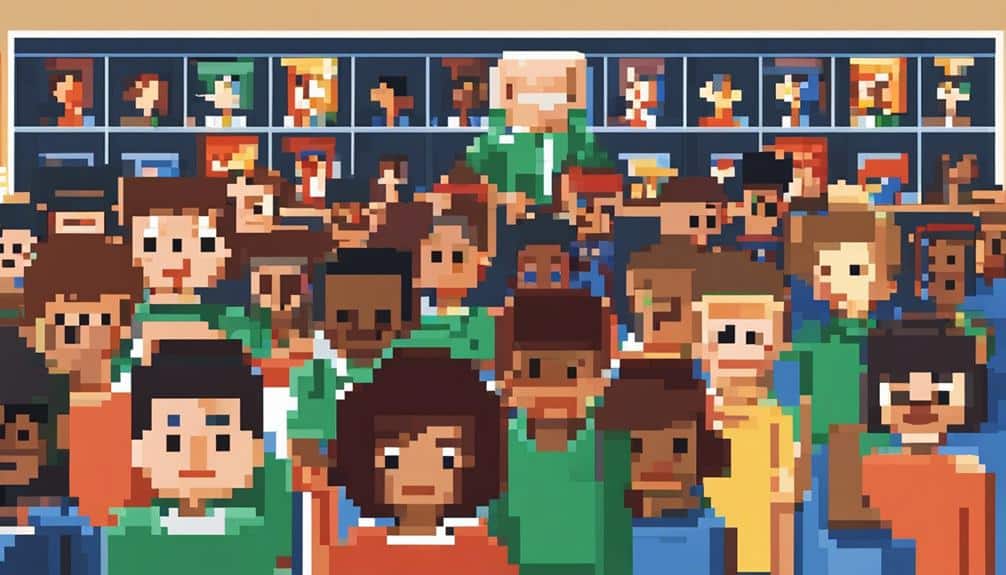
Amidst the chuckles and cringes evoked by George W. Bush's memorable quotes, his presidency left behind a complex legacy with valuable lessons to ponder. From the infamous 'Mission Accomplished' blunder to the mishandling of Hurricane Katrina, Bush's legacy is a colorful tapestry of questionable decisions and misguided actions.
One key lesson we can extract from his time in office is the importance of thorough planning and informed decision-making. For example, rushing into war without a clear exit strategy can lead to long-lasting consequences and destabilize entire regions.
Additionally, Bush's legacy serves as a cautionary tale about the power of unchecked executive authority. His administration's overreach in surveillance programs and erosion of civil liberties highlights the need for robust checks and balances to protect democratic principles.
Conclusion
So, next time you find yourself pondering life's deepest questions, just remember: is our children learning?
Thanks to George W. Bush, we now have a timeless quote to remind us of the importance of education and the occasional slip of the tongue.
Let's all take a moment to appreciate the humor and wisdom that can come from a simple grammatical error.
After all, laughter is the best medicine for our linguistic mishaps.
